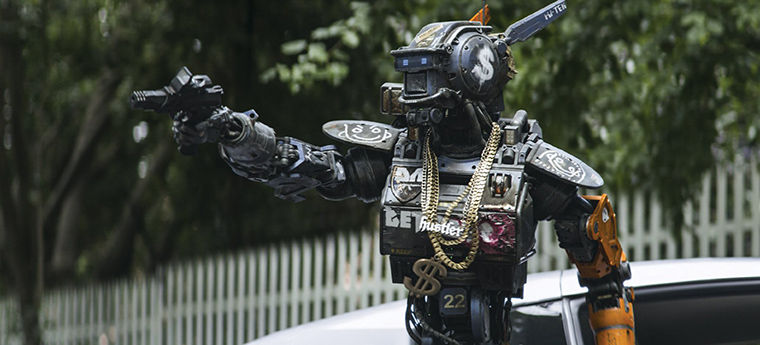“Chappie” delivers well-devoloped plot, characters
“Chappie”
March 16, 2015
“Chappie” is latest film from Neill Blomkamp, the sci-fi rookie behind “Elysium” and “District 9.” His first film was a critical smash, but after his own expressed disappointment with his sophomore film—a film with box office success and that fared well with critics— Blomkamp has returned to where it all began: the gritty streets of South Africa. The biggest question facing directors like Blomkamp is whether or not he will fall prey to the Hollywood machine or survive with his integrity intact.
What results is a fast-paced, big-budgeted, wild ride of a film. Despite the film tackling several angles, its core is an extremely touching heart. The film is summed up by its titular character—a metal robot with a soul.
The story takes place in Johannesburg, where the government has employed the use of a robotic police force manufactured by the company Tetravaal, whose CEO is played by Sigourney Weaver (“Avatar”). The inventor, Deon, played by Dev Patel (“Slumdog Millionaire”), infuses one of them with true Artificial Intelligence. That robot is then named Chappie, played by Sharlto Copley (“District 9”). Chappie and Deon are kidnapped by thugs wishing to use the robot for a heist. All the while, a fellow engineer at Tetravaal, played by Hugh Jackman (“Les Miserables”), tries to undermine Deon while attempting to implement his own brand of robots.
The complicated plot involves many moving parts and borders being convoluted, yet the filmmakers do an excellent job of delivering immense amounts of information in a very short time. At no point does the audience feel overwhelmed or lost, even though major elements are left unexplained. Blomkamp makes an effective use of newsreels and stock footage to build the world as fast as possible.
From there, the film begins its plot at lightning speed, with having all the leads and most of the plot introduced within the first 30 minutes. It pays off because the film does not waste time on exposition—the story gets to spend more time with its star, Chappie.
One of the downsides is the audience never gets to settle. The viewer is in constant motion, moving from scene to scene. No pondering, no pauses—just action. Although that makes for entertaining film, it prevents character development and thematic growth.
“Chappie” can be completely over the top, almost to the point of being campy. Sometimes it is the performances, other times the dialogue, but mostly it is the actual science. This movie takes some wild jumps in the story, and the viewer either needs to be able to take those jumps with them or risk ruining the movie for themselves.
At its most ridiculous moments, “Chappie” remains aware of itself without even attempting subtlety. Through all the noise, the film still makes its focus clear; Chappie.
The irony of “Chappie” is that the talking piece of metal is more complex than any of its human characters. This protagonist is the love child between fantastic special effects and wonderful voice and movement from Copley. Watching Chappie learn and explore the world around him with a very human mind instantly connects to audiences, making him the film’s strongest element.
All the performances in “Chappie” are enjoyable, except the characters being portrayed are entirely half-baked. As the film focuses mostly on the storytelling, and does so at a rapid speed, no complexity forms for these individuals.
The two robbers who steal Chappie and attempt to train him are played by the real life South African duo Ninja and Yolandi Visser who make up the rap group Die Antwoord. The two rappers play themselves and the film features a large amount of their music in the soundtrack. Ninja and Visser are fantastic, especially for their first time performing in a feature film.
Unfortunately, for a film rooted in a country so plagued by long-lasting racism, the cast lacks people of color. If Blomkamp really wants to represent the lives of South Africans, he should begin by showcasing the lives of all South Africans.
Because “Chappie” is science fiction, it should explore issues presented in our current society through fantastical worlds. However, “Chappie” does not exactly do this. Although the subject is centered around AI, it never truly contemplates it. The themes running through the film do not run deep. It is not a complex story as far as subject is concerned—the elements do not haunt the viewer. There is hardly any discussion on the repercussions of digital conscious, it is just presented.
Yet, that does not necessarily mean there needs to be. There have been countless films on the subject, each showcasing very real consequences of AI. “Chappie” does not seem to be concerned with that. The viewer will not debate whether Chappie has a genuine soul or not, he is presented with one and that is that. This allows for a very human and touching story to shine through.
It is a wildly entertaining movie despite that it possibly leaves audiences behind, the ever-human metal robot saves “Chappie” from being just another action film.








